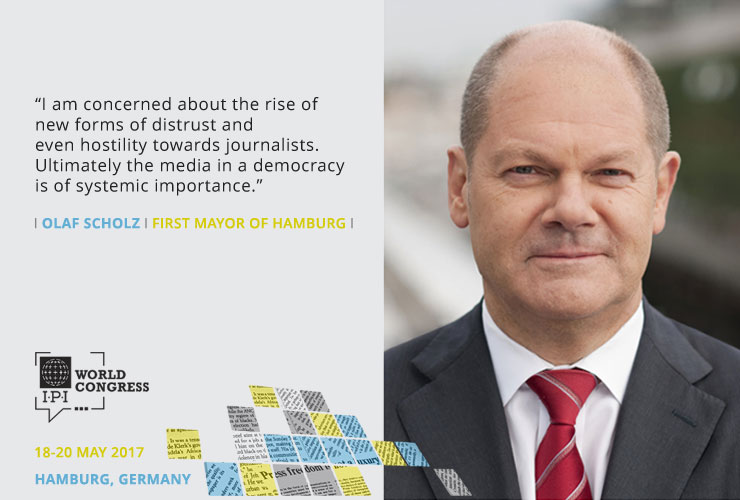IPI is proud to announce that Hamburg First Mayor Olaf Scholz will deliver the keynote speech at the Opening Ceremony of the 2017 IPI World Congress, to be held at Hamburg City Hall on Thursday, May 18 and generously hosted by Hamburg’s Senate.
IPI spoke to Scholz, a former labour and social affairs minister in the cabinet of German Chancellor Angela Merkel, about his city’s role as one of Europe’s most important media hubs, the digital transformation of the media and the need for self-critical introspection by journalists and politicians alike.
IPI: Hamburg is home to some of Germany’s largest media companies, employing over 70,000 people. What has your administration done to ensure that Hamburg remains an important media hub in spite of the growth of Berlin and the competition it presents?
Scholz: First of all, the media companies benefit from the wide variety of companies located in Hamburg. In hardly any other place will you find so many relevant companies from every sector of the media business, which are both nationally and internationally significant. Numerous major players from the global-network digital economy have their German headquarters in Hamburg. Hamburg has established itself as the place where established business models can be transformed in a professional way. Over the years a particular expertise has been built up in earning money from content, also within the digital economy. Cooperation between partners from the Internet and technology business has played an important role in this respect. The Senate of the Free and Hanseatic City of Hamburg actively supports this development within the industry. We are promoting the reform process in media policy so that companies are provided with a reasonable and up-to-date operating framework. And we are providing support to digital transformation in local companies, for example, in our business location initiative nextMedia, where we bring together content producers with technology providers so that new forms of cooperation can be tried out.
IPI: You have noted the importance of an introspective, self-critical exercise by journalists and news media to ensure that they fulfil the highest standards of quality and are not guided by sensationalism or economic interests in their editorial decisions. This effort to identify best practices in journalism is at the core of the IPI World Congress. In your view, on which issues should such self-critical introspection focus?
Scholz: Politicians should not be in the habit of telling journalists how to do their job. At the same time, I am concerned about the rise of new forms of distrust and even hostility towards journalists. Ultimately the media in a democracy is of systemic importance. Therefore, as I see it, the biggest challenge for journalism is to defend its economic and journalistic relevance. This can only succeed when citizens trust in its ability to discuss social and current affairs in a really responsible, in-depth and balanced manner. Readers and voters should rightly expect the media to present them with all of the arguments on controversial issues within the bounds of democratic common sense, so that they can form their own opinions. Politicians and journalists bear a major societal responsibility for democratic discourse. Therefore, we should regularly ask ourselves the question: Am I living up to this responsibility?
IPI: You have often spoken about the “social and democratic dimensions” of digital transformation of the media and called for the need to ensure that fundamental values are protected in the process of the digital transformation. Which policies and other remedies are necessary to fulfil this ideal? Are we on the right track?
Scholz: We are making progress in creating media legislation for the digital age. This includes providing a level playing field for media companies and new competitors. In particular, this concerns issues relating to transparency, non-discrimination and retrievability, so that media diversity is guaranteed in the future. We have to ensure that digital agents do not implicitly favour or disregard certain offers without the user being informed. If one adds to this the principle of transparency, then retrievability of content important to forming opinion can be guaranteed. Apart from this issue, we have also been closely following the recent discussions about social bots and fake news with a great deal of concern. This is first and foremost a challenge for public advocates and consequently for professional journalists. We should, however, be careful about rushing into well-intentioned hasty legislative solutions, as in the area of freedom of expression one can quickly overstep the mark.
Hamburg’s impressive City Hall will present the perfect backdrop for the grand opening of the IPI World Congress on May 18, 2017. It will also provide the stage for IPI’s Awards Ceremony honouring journalists and press freedom advocates who have displayed tremendous courage in fighting for independent journalism. The website for the 2017 IPI World Congress, with a more-detailed programme, is available here.



